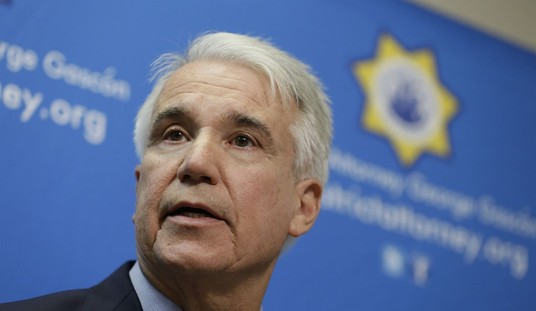Not too much attention has been paid to our efforts to “degrade and destroy ISIS” in the past few days. Perhaps the White House can find something in this election cycle for which to be grateful, because this Washington Post report on our efforts to use proxies for that mission would otherwise dominate the news cycle. Not only has the US focused entirely on preparing our “moderate” allies in Syria for defense rather than attacking ISIS, they turned out to be incompetent even at that effort:
The Obama administration’s Syria strategy suffered a major setback Sunday after fighters linked to al-Qaeda routed U.S.-backed rebels from their main northern strongholds, capturing significant quantities of weaponry, triggering widespread defections and ending hopes that Washington will readily find Syrian partners in its war against the Islamic State.
It’s not just that they got defeated — some of them switched sides:
Moderate rebels who had been armed and trained by the United States either surrendered or defected to the extremists as the Jabhat al-Nusra group, affiliated with al-Qaeda, swept through the towns and villages the moderates controlled in the northern province of Idlib, in what appeared to be a concerted push to vanquish the moderate Free Syrian Army, according to rebel commanders, activists and analysts.
Other moderate fighters were on the run, headed for the Turkish border as the extremists closed in, heralding a significant defeat for the rebel forces Washington had been counting on as a bulwark against the Islamic State.
Michael Totten says that Syria is gone, and so is any hope of containing ISIS without boots on the ground:
They were bad proxies anyway. The Syrian Revolutionary Front was an Islamist organization. Less deranged than Al Qaeda and the Islamic State, sure, but it was still an Islamist organization. Harakat Hazm is more secular, but it consists of a measly 5,000 fighters while the Islamic State has as many as 100,000.
Syria is gone. The only portions of that former country that may still be salvageable are the Kurdish scraps in the north. The Kurds are good fighters and they may be able to hold on with our help, but there is no chance they will ever destroy the Assad regime or the Islamic State. They don’t have the strength or the numbers.
So unless the United States decides to invade outright with ground forces—and fat chance of that happening any time soon—we’re going to have to accept that the geographic abstraction once known as Syria will be a terrorist factory for the foreseeable future.
To the east, Iraq is planning a new offensive against ISIS, but with phantom divisions, at least at the moment:
Iraqi security forces, backed by American-led air power and hundreds of advisers, are planning to mount a major spring offensive against Islamic State fighters who have poured into the country from Syria, a campaign that is likely to face an array of logistical and political challenges.
The goal is to break the Islamic State’s occupation in northern and western Iraq, and establish the Iraqi government’s control over Mosul and other population centers, as well as the country’s major roads and its border with Syria by the end of 2015, according to American officials.
Iraqi and Kurdish forces have made inroads in recent weeks in securing territory threatened or captured by the Islamic State, including the Rabia border crossing with Syria, the oil refinery in Baiji north of Baghdad, the northern town of Zumar, and Jurf al-Sakhar southwest of Baghdad.
But the major push, which is being devised with the help of American military planners, will require training three new Iraqi Army divisions — more than 20,000 troops — over the coming months.
Let’s try to remember a couple of points here. We trained the existing Iraqi army while we maintained a large presence in the country, funded their development and their armaments, and kept Nouri al-Maliki from purging the Sunnis and Kurds from its command. After several years, we produced a reasonably professional army, which had 271,000 active-duty troops (not necessarily all combat troops) as of March of this year. The Sunnis have been purged, and the Shi’ite militias are adding fighters. How long exactly will it take to recruit and train another 20,000, and what would be their effectiveness in an actual firefight? Considering how the trained military performed over the past few months, that doesn’t sound very promising at all.
The LA Times paints a dismal picture of those prospects:
The military collapsed in Mosul even though Washington spent eight years and $25 billion to train, arm and equip Iraq’s security forces. The United States has now deployed 1,400 advisors to try to rebuild the shattered military into a force that can repel Islamic State.
American commanders say the Iraqi army won’t be ready to mount operations to retake Islamic State-controlled cities such as Mosul for many months. Meanwhile, Iraq’s government has turned to Shiite Muslim militias and Sunni Muslim tribesmen as it scrambles to keep the Sunni militants from advancing on Baghdad and its airport.
The U.S. military has not explained how a few more months of “advise and assist” will create a functional army after years of training was followed by wholesale desertions in Mosul and in Anbar province to the west of Baghdad. Soldiers and police seeking to avoid mass executions if they were captured left behind weapons, ammunition, vehicles and other U.S.-supplied equipment now used by Islamic State to attack more government positions.
In fact, without Americans on hand to impose discipline, the prospects look hopeless:
Officers in one of many units that collapsed in Mosul, the 2nd Battalion of Iraq’s 3rd Federal Police Division, said their U.S. training was useful. But as soon as their American advisors left, they said, soldiers and police went back to their ways.
“Our commanders told us to ignore what the Americans taught us,” Shehab said. “They said, ‘We’ll do it our way.'”
In other words, good luck trying to “degrade and destroy” ISIS through the weak proxies on either side of the former Iraqi-Syrian border. As Totten writes, until we decide that this mission is worth doing ourselves, it won’t get done at all — or will it? The AP reported today that Egypt, Saudi Arabia, the United Arab Emirates and Kuwait are considering the formation of a ground force to intervene in the conflict, which might help in Syria — but might touch off a bigger war, since those nations want to push Bashar al-Assad out of power, too, and counter the influence of Iran:








Join the conversation as a VIP Member